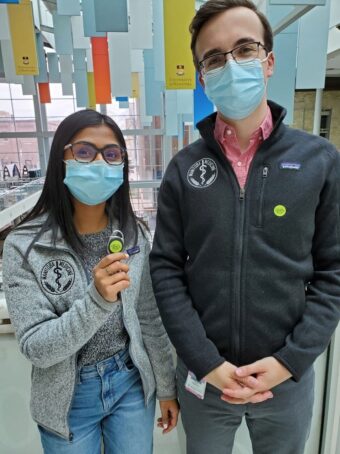Trusted Advice from a Familiar Source
The Key Role Physicians Played in Manitoba’s COVID-19 Vaccine Campaign
By Keir Johnson
After months and months of COVID-19, with no certain end in sight, it finally happened.
It was December 9, 2020.
Health Canada approved the first COVID-19 vaccine, 273 days after the pandemic had been declared.
And just a few days later, on December 16, the first dose was administered in Manitoba to Dr. Brian Penner, an internal medicine specialist at Health Sciences Centre.
“I am now safer for my friends and colleagues,” Dr. Brian Penner said at the time, adding “I hope everyone does their part
There it was. The hope we all needed. The end was in sight.
In the initial days and weeks that followed, the supply of vaccine was extremely limited. It was administered in just a handful of provincially-run
immunization clinics, prioritized for critical health care workers and the oldest Manitobans who were at greatest risk.
But many questions remained. When would people be eligible? How would the province roll out this precious medical resource? How would
Manitobans be persuaded to accept a vaccine that had been developed, tested, and approved over just a few months?
Physicians were already looking ahead. They wanted to play a role in supporting vaccine confidence and uptake among Manitobans.
Doctors Manitoba jumped into action. By January, a report was released with results from a survey of physicians. The aim was to quickly demonstrate to Manitobans the confidence and trust doctors already had in the new vaccines.
“Physicians overwhelmingly support these new COVID vaccines and we see them as a way out of this pandemic,” explained Dr. Cory Baillie, the President of Doctors Manitoba as he released the report. And the results were compelling, with over 90% of physicians indicating they would get immunized and would recommend the vaccine to their patients.
A few weeks later, in early March, Doctors Manitoba launched a major public awareness campaign about the vaccines.
“We created ManitobaVaccine.ca to help everyone learn more about the COVID vaccines, when and where they can get immunized, and the option to get notified when they become eligible,” Dr. Baillie said as he unveiled the new resource. “These are new vaccines for a new disease, so it’s natural to have questions.”
Doctors Manitoba, an organization that wasn’t known by many Manitobans before the pandemic, was flooded with calls and emails. Many took the time to express their appreciation, describing the site as “easy-to-use”, “reliable” and “excellent.”
“Thank you for creating this helpful website,” wrote one 69-year old woman. “A real indication our doctors care about their patients.”
Another individual wrote in to describe their experience. “I signed up my elderly father just yesterday and today I received a text that he was eligible. This site also guided me through the process of securing an appointment for him by providing phone numbers and site locations. It’s comforting to know that somewhere my name will come up to inform me that now, it’s time for me.”
The site became a central hub for Manitobans trying to find out when they would be eligible for the vaccine, or looking for reliable information from a trustworthy source. A month after the campaign was launched, a public poll found over half (53%) of Manitobans were familiar with the Doctors Manitoba resource, with 93% of those who had used the site describing it helpful.
While encouraging news for the campaign, the public survey also had a very troubling finding. Not enough Manitobans were planning on getting vaccinated to get the province to herd immunity.
At this point, most vaccines were being administered in provincially-run mass immunization super sites, where efficiency was king. But these were not the preferred locations for most people. The top choice, preferred by nearly 9 out of 10 Manitobans, was to receive the vaccine in a doctor’s office.
In fact, that same public poll found nearly half of those who were hesitant about the vaccines said they would be more likely to get immunized at a doctor’s office. This would give them a one-on-one opportunity to discuss their concerns in a familiar place with a trusted medical professional. Doctors Manitoba had been working with provincial officials to explore how doctors’ offices could play a bigger role.
Dr. Cory Baillie helped to make the case. “We all owe it to Manitobans, who have endured through very difficult times, to get the vaccine to them as quickly as possible so we can get back to a normal way of living” he said early in the immunization rollout. “Manitoba’s physicians can help in several ways to ensure our province is a leader when it comes to this unprecedented immunization challenge.”
After further advocacy by Doctors Manitoba, the province started to make more and more of its vaccine supplies available to physicians and their patients.
In fact, a survey by the College of Family Physicians of Canada found 56% of family doctors in Manitoba offered a COVID-19 vaccine in their practice, the highest rate by far compared to other provinces.

Addressing Persistent Hesitancy
As vaccine uptake increased, it was clear that some communities were lagging behind, fueled by deeper hesitancy about vaccines.
This included communities in Southern Manitoba, such as Winkler and Steinbach.
In an open letter to the people of Steinbach, physicians from that community asked people to trust them about the COVID-19 vaccines.
“In the past you have trusted us as we delivered your babies. You have trusted us as we have treated your cancer. You have trusted us in the Emergency Department with your heart attacks and injuries. Now we are asking you to trust our advice again.”
In June, Doctors Manitoba hosted a series of virtual town halls with panels of physicians answering a wide range of questions about the COVID-19 vaccines. This included special sessions for communities in Southern Manitoba. Thousands of Manitobans tuned in to watch and participate.
Dr. Don Klassen, a family physician from Winkler, was a panelist in one of the town halls. “Changing minds is sometimes a process and hopefully we were able to provide information that was helpful to people in that process. If we happen to change a mind or two along the way, or hopefully a few more, then that would be considered a success.”
Physicians also made numerous appearances on TV, radio and in newspapers to answer questions about the vaccines and talk about their safety and effectiveness.
Meanwhile, some racialized communities were also seeing lower vaccine uptake. In a partnership with Doctors Manitoba, UMulticultural Manitoba created a series of videos with physicians talking about COVID-19 and the vaccines to connect with Manitobans who are Black, Indigenous and People of Colour.
As vaccine uptake started to plateau, Doctors Manitoba organized a Vax-a-Thon to reach Manitobans who had put off getting fully vaccinated. Over 25 clinics participated.
Dr. Candace Bradshaw, a family physician and President-Elect for Doctors Manitoba, signed her Winnipeg clinic up for the Vax-a-Thon. “This is definitely an open call,” she said at the time, inviting any and all Manitobans to join in. “Just come as you are. We’ll talk about whether you’re eligible and give you a shot right on the spot.”
Doctors Helped in Many Other Ways

Offering the vaccine in their practice was just one of the ways physicians helped with the massive immunization effort. In fact, there is likely no physician in Manitoba that didn’t take time with their patients to offer advice and counselling about the COVID vaccines.
For a small number of Manitobans, it wasn’t hesitancy standing in the way of getting their vaccine. It was a serious allergy.
But this didn’t mean immunization was an impossibility.
The team of allergists at HSC established a special clinic to assess Manitobans with serious allergies to vaccine components and offer a safe environment in which to receive the vaccine under medical supervision.
“While severe allergy to COVID-19 vaccines is incredibly rare, many patients were concerned about allergy to the vaccine or its components,”explained Dr. Lana Rosenfield. ” My colleagues and I have been able to reassure almost all patients and providers that they could proceed with vaccination, or facilitate vaccination in our clinic. For some, that meant administering the vaccine in small doses over several hours in the hospital.”
Over 800 patients have been assessed by the clinic, which continues to operate today to support patients with potentially serious allergies.
At the provincial vaccine super sites, physicians were called on to support patients with specific questions or complex medical issues to help them make an informed choice about immunization. This team of over 120 physicians worked over 1,400 shifts at the two Winnipeg locations. Conservatively, it is estimated they provided counselling and advice to well over 100,000 Manitobans.
Dr. Ewoma Avanoma worked many shifts supporting hundreds, if not thousands of patients on their vaccine journey.“I found it very rewarding to support thousands of Manitobans in making an informed decision to get their COVID-19 vaccine.”
Of course, physicians also played leadership roles in the provincial vaccine rollout.

Dr. Joss Reimer, a Medical Officer of Health, was appointed to the role of Medical Lead for the Vaccine Implementation Task Force. While she had worked on vaccination initiatives in the past, no previous work had the pressure and intense public scrutiny as the COVID-19 immunization project. She had to continuously review new and emerging research to ensure the vaccines were given first to those most-at-risk.
Dr. Reimer set up a medical advisory group of physicians from over two dozen different specialty areas, tapping into their medical expertise to help make decisions about vaccine eligibility and clinical guidance.
Looking back, Dr. Reimer remembers the intense pressure. “There were many challenges, but what stands out to me was the incredibly short timelines and ever-changing information under which we had to get the vaccination program organized and running.”
“A big learning curve for us was understanding the variety of mindsets and concerns people have about being vaccinated,” she added. “It really emphasizes the importance of education and providing easily understood information about vaccination available to Manitobans.”
Dr. Reimer was selected as Doctors Manitoba Humanitarian of the Year for 2022 for her leadership role in the herculean immunization effort.

Dr. Marcia Anderson, also a Medical Officer of Health, played a pivotal leadership role with the First Nations Pandemic Response Co-ordination Team. Dr. Anderson’s work earned her the honour of Physician of the Year from Doctors Manitoba for supporting Manitobans from Black, Indigenous and Racialized communities through the pandemic.
“By ensuring the right data was collected, she was able to demonstrate the disproportionate impact COVID-19 was having on these communities in order to influence provincial policy and ensure earlier and targeted vaccine access,” explained Doctors Manitoba President Dr. Kristjan Thompson. “This work led to a reduction in the disparities in the subsequent wave of COVID-19, which is truly a major public health success story!”

Medical learners played important roles as well. Some worked at the provincial super sites. Two medical students, Anmol Mann and Philip Kawalec, created a campaign to promote vaccine confidence and combat vaccine hesitancy. The initiative, supported by the Manitoba Medical Students’ Association and Doctors Manitoba, designed, printed and distributed stickers to participating clinics to give to patients after they were immunized. While similar to a provincial government initiative, the students’ sticker campaign started earlier, offering one of the first ways for Manitobans to show off their pride for “joining the herd.”